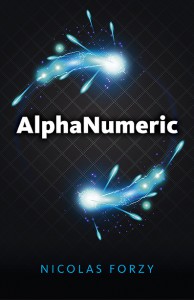
 ‘AlphaNumeric’ is a science-fiction fantasy adventure that takes
place in a world where numbers and letters are alive. When a reckless dyslexic teenager accidentally arrives there, it triggers a prophecy that plunges the two rival communities into alphanumerical
war. To escape, he will have to join forces with an ambitious young vowel to harness the forbidden power of geometry and conquer the three dimensions to fly.
‘AlphaNumeric’ is a science-fiction fantasy adventure that takes
place in a world where numbers and letters are alive. When a reckless dyslexic teenager accidentally arrives there, it triggers a prophecy that plunges the two rival communities into alphanumerical
war. To escape, he will have to join forces with an ambitious young vowel to harness the forbidden power of geometry and conquer the three dimensions to fly.
‘AlphaNumeric’ started on a trip I took with my father. On a particularly long stretch of straight road, we began to imagine a world either side of this road, with rival tribes living opposite from each other. The natural contrast of numbers on one side and letters on the other made total sense to me. From there, it was just a matter of time before full-fledged characters emerged, each with their own quirks and features.
The hero of the story desperately wants to change, going to extreme lengths to do so. The consequence is that he arrives in this world where everything is foreign and mysterious, and where he will have to overcome his greatest weakness and face his greatest fear in order to escape back to his world. For young adults, this mirrors the struggles that most of them face every day, trying to fit in, trying to be someone they think we all want them to be. In the end, the story shows us that it’s by trusting others, by working together and by facing fears head on rather than avoiding them that you can become everything you want to be.
I believe dyslexia is a condition that needs to be addressed responsibly. It affects around ten percent of the global population, which is a huge number of people. It can make young adults feel marginalised, unappreciated and it inevitably has an impact on their self-confidence. In ‘AlphaNumeric’, the hero suffers from dyslexia but compensates for it with a keen grasp of mathematics. This is what helps him overcome his weakness in the course of the story, and it is also at the heart of the story’s theme: by working together, blending ideas and disciplines together, we can evolve, we can improve and grow as a society. I don’t think dyslexia is a handicap, I think it’s an obstacle that people can overcome with the right support, the right approach and the right attitude.
With ‘AlphaNumeric’, I wanted to present numeracy and literacy as superpowers. I wanted readers to feel that the characters were using their imagination or their logic as an amped-up manifestation of their intelligence. This way, I could associate intelligence with strength, because the smarter you are, the more you can do in this world. It’s not so much about how big you are, it’s about how fast on your feet and how clever you can be with your mind and your heart in play. I wanted this story to praise brains over brawn. Not that there’s anything wrong with being strong, I just wanted to focus on the importance of being smart.
I believe it’s very important to know the world of your story inside out before you start writing. In that sense, it’s a little like building a videogame, where you set up your world for players to exist within it. I wanted each world to be radically different than the other in terms of appearance and mindset, yet it was quickly clear that both should be structured in similar ways. So in the System of Numbers, everything is angular, geometric and black & white, to reflect the accuracy and precision that mathematics represent. Textures are shiny and metallic, and time is measured constantly. In the Land of Letters, everything is colourful, with curves everywhere and natural textures like wood and stone, to express the artistic aspect of literature. Time doesn’t really matter, only the present is important. As much as the two worlds are different, they are also similar. Each one has a form of government, an elite group that sets the tone: prime digits in the System of Numbers, vowels in the Land of Letters. In both cases, these are exceptional members of society, so it made sense to have them in charge. Beyond this, I had to come up with ways for the two sides to interact with one another, using punctuation to carry message back and forth, since commas and dots are used in both literature and mathematics. I also needed some sort of power that each world could use to build things and develop as a society, so while numbers can use logic to create shapes and objects, letters can use imagination. It all made sense as I continued building, so everything you find in the book is a connected element of the same universe. And there’s more to come in the sequels…
After building the world, I already had the main dynamics that motivate numbers and letters as characters. What I then had to do was to create individuals, standalone characters from each side that made sense both as members of their respective societies and as story forces to drive the plot forward. For example, Yana, the little vowel that the hero meets, wants to join the government and become a vowel, since she’s only a letter Y which isn’t considered a proper vowel. She feels discarded and unappreciated, and she lost her father in a previous war that we find out about early on in the story. This makes her a little reckless and a little bossy but also very vulnerable, so we instinctively want to protect her, just like the hero wants to do. I tried to do the same with every character to make the story more compelling.
Once I build the world and once I have my characters defined, I use screenwriting techniques to build my story. When you write a screenplay, there are key turning points that occur at specific moments in the story. They are often called story ‘pillars’, because they support the whole story arc. I map out all these key story points as a guide, then I work my way back to find ways to stitch these pillars together. I break it down further into scenes, from one pillar to the next, until I end up with a full list of scenes, sequences and turning points. At that stage, I can check whether the pace is right, since I now have a rough idea of page count and duration, so I can quickly see if a sequence is too long, too early or too late in the story, and I can rectify that just as quickly. I do this until I’m sure that my structure is solid, then I start writing the manuscript. By that stage, everything is mapped out so the writing comes quickly because of all the work that has been done. It’s a very efficient and effective method that works well for me, I’d recommend it to everyone as a way to write productively.
In my case, I went with an independent publisher because they showed incredibly fast response time and complete transparency over the publishing process. Lodestone Books, an imprint of Collective Ink, is run by authors, so the writing dynamic is something they understand very well. They have a fantastic online platform where all the information you could possibly want is just a click away. They work on the premise that you should share your information too, so any contacts you make can be entered into their database for other authors to use. I find that system tremendously motivating, since you get out of it as much as you put in, if not more. The community of writers within the imprint, and even across other imprints, is very tight knit, which allows new writers like myself to connect with more established authors and share experiences and tips. I had to submit a detailed business proposal along with my manuscript, and I took that as a clear sign of professionalism. I spend a lot of time marketing the book online and at trade shows, as well as through book chains. Since I’m based in Dubai, UAE, I don’t have physical access to the large European and US markets, but because my publisher is 100% online, I still have resources to use to help raise awareness for the book. Overall, it’s a great learning process that prepared me well for my next books.
Nowadays, with so many independent avenues for stories, from blogs to YouTube, from eBooks to apps, I choose to embrace this as a wonderful look into a bright future where storytelling will have pride of place. Stories enrich us in so many ways, having more of them around will surely be a blessing for everyone. I look forward to discovering more authors, and I look forward to sharing many more stories with readers, in whatever shape or form, in the years to come.
Read on.
Categories:
0 comments on this article







